|
|
|
Sort Order |
|
|
|
Items / Page
|
|
|
|
|
|
|
| Srl | Item |
| 1 |
ID:
174298
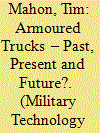

|
|
|
| 2 |
ID:
156781
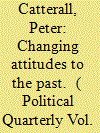

|
|
|
|
|
| Summary/Abstract |
What societies choose to remember about the Past can pose challenges for professional gatekeepers in museums, archives and statutory bodies charged with managing national heritage. Recent examples examined in this article include the inauguration of the National Museum of African American History and Culture in Washington, the 2016 Capability Brown Festival, changing attitudes towards poppies and the Rhodes Must Fall movement. These are explored through establishing a taxonomy of the eight functions that lieux de mémoire fulfil in the course of reflecting the Past to the Present. Drawing attention to the way in which the imperialism of the Past is buried beneath the pristine lawns of Capability Brown's gardens in the Present, this article concludes by warning that lieux de mémoire can provide an aesthetic veneer, glossing over aspects of the Past that societies, or elites within those societies, would, for their own purposes, rather forget.
|
|
|
|
|
|
|
|
|
|
|
|
|
|
|
|
| 3 |
ID:
166058
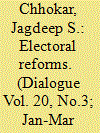

|
|
|
| 4 |
ID:
149322
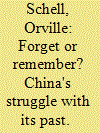

|
|
|
|
|
| Summary/Abstract |
In probing a country’s future prospects, one can do worse than contemplate its past. And nowhere is history more relevant to the future than in China, a nation that has for millennia seen its destiny inextricably connected to the dynastic record of what has preceded. And yet, today the People’s Republic of China's official national narrative—that elusive composite of principles, prejudices, hopes, fears, and dreams that cast the die for how leaders will attempt to project their country in the future—has become so filled with lacunae, biases, and untruths that it reads more like a didactic script than a real historical record.
|
|
|
|
|
|
|
|
|
|
|
|
|
|
|
|
| 5 |
ID:
168748
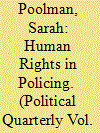

|
|
|
|
|
| Summary/Abstract |
This article seeks to demonstrate, largely from practitioners’ perspectives, the growing evolution in understanding and implementation of meaningful human rights standards within the policing context. In the early 2000s, human rights were perceived and treated as a rather restrictive framework in UK policing. They are now more readily seen as a set of tools that guide and help the police to balance the views and interests of all parties to the criminal justice process. Human rights values enable police in the UK to better endeavour to do the right thing, ‘without fear or favour’.
|
|
|
|
|
|
|
|
|
|
|
|
|
|
|
|
| 6 |
ID:
148112
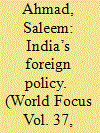

|
|
|
|
|
| Summary/Abstract |
In fine, there is no doubt that the leadership style of the PM Modi has raised the credit of India at the international level and his fresh coat of paint on India’s foreign policy has also created its image as a leading power in the 21st century. PM Modi’s unique approach to the Indian foreign policy has played a significant part in emerging ties with the leading countries of the world and the future of India’s foreign policy looks very bright. In the era of globalisation, where geoeconomics has become prime centre of the world countries, therefore, PM Modi has also focussed on the Indian foreign policy and fine-tuned according to the need of hour, and during his half tenure, the fruits of changes in Indian foreign policy have become visible, and one can see that, at present, India and the United States of America have become very close to each other than earlier and both are standing at one platform and therefore the 21st century will be witnessed of their close partnership.
|
|
|
|
|
|
|
|
|
|
|
|
|
|
|
|
| 7 |
ID:
104308
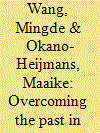

|
|
|
|
|
| Publication |
2011.
|
| Summary/Abstract |
Historical disputes and nationalism continue to be issues of concern and controversy in the relationship between Japan and China. In 2005, popular nationalist sentiment culminated in nationwide anti-Japanese movements in China. This led to a crucial shift in the way China and Japan deal with history and popular nationalism. An unprecedented dialogue on war memory was initiated in late 2006, and the Sichuan earthquake relief effort in mid-2008 marked a further departure from earlier patterns. The Chinese government shifted away from conventional historiography that largely fed negative images of Japan. While these developments point to new, cooperative attitudes that aim to contain popular nationalist sentiment in manageable proportions, relations are nevertheless increasingly obscured by other tensions in the bilateral relationship.
|
|
|
|
|
|
|
|
|
|
|
|
|
|
|
|
| 8 |
ID:
086175
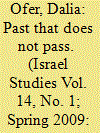

|
|
|
|
|
| Publication |
2009.
|
| Summary/Abstract |
The article raises issues that relate to the centrality of the Holocaust in the lives and imagination of many Israelis, and as a pivotal event that shapes their Jewish-Israeli identity. It examines the positions held by Israelis on the meaning of the Holocaust and the shaping of its memory, and asks whether the presence of the Holocaust in our lives represents an honest, unwavering effort to understand the Holocaust and its place in our world as human beings, Jews, and Israelis, or is a result of manipulating forces that use and abuse the memory of the Holocaust to advance unrelated political or social causes. The article presents a profusion of voices in Holocaust discourse and asks whether these are complementary or conflicting messages. It discusses the groups for whom the Holocaust was a personal experience, their offspring, who experienced the Holocaust as a family memory, and others whose memory of the Holocaust was shaped by survivors' testimonies, social processes, and the internalization of cultural messages. It focuses on the contribution of these groups in Holocaust research and artistic representation centering on literature, film, and music.
|
|
|
|
|
|
|
|
|
|
|
|
|
|
|
|
| 9 |
ID:
139023
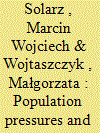

|
|
|
|
|
| Summary/Abstract |
This article examines the relationship between the populations of the more and less developed societies between the first century and 2100. Such an analysis reveals a changing dependency between the level of development (and GDP) achieved and population numbers between the first century and 1998. In relation to the past the article suggests a dynamic model for dividing the world into more and less developed areas. In relation to the present and the future it bases the population analysis on the developmental division of the world as published by one of the co-authors of this article. The article largely uses population estimates (with those referring to the past taken from Angus Maddison and those referring to the future from the most recent projections by the United Nations). Taking the 2013 UN projection as a model, it discusses three variants for demographic development in the North and South up to 2100. It argues that the more restrictive population growth variants of the UN projection predict a greater relative ‘Third Worldisation’ of the world than does the most dynamic projection.
|
|
|
|
|
|
|
|
|
|
|
|
|
|
|
|
| 10 |
ID:
122830
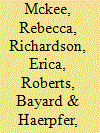

|
|
|
|
|
| Publication |
2013.
|
| Summary/Abstract |
Previous research has reported substantial levels of nostalgia for the Soviet era among citizens of some of the independent republics that emerged from its collapse. We report new analyses from eight former Soviet republics, and from two surveys, in 2001 and 2010, comparing attitudes to government in the Soviet period and at the time of the surveys, as well as expectations for the future. Everywhere, views of the past have become less positive and those of the present more positive. However, both the views in each survey and the change between each of them vary among countries and socio-demographic groups.
|
|
|
|
|
|
|
|
|
|
|
|
|
|
|
|
| 11 |
ID:
156772
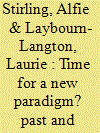

|
|
|
|
|
| Summary/Abstract |
This article seeks to place the UK's present economic ‘moment’ in historical context. Over the course of the decade since the 2007 financial crisis, it has increasingly been acknowledged that a cyclical crisis has become a structural crisis. The failure of most economists to predict the financial crash in the first place, and the inadequacy of economic policy in responding to its lasting effects, has led many to conclude that economics itself is in crisis. This article seeks to contribute to a better understanding of the present period of disjuncture. Drawing on theories of paradigm shift from both the physical and social sciences, we argue that the speed of change in UK economic policy is comparable to the two major historical transitions that ended with the post-war consensus and neoliberalism. We conclude by offering some remarks on how and where the present change might take us.
|
|
|
|
|
|
|
|
|
|
|
|
|
|
|
|
| 12 |
ID:
189562
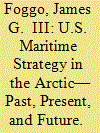

|
|
|
|
|
| Summary/Abstract |
Warming waters and melting sea ice will create new challenges off our northern shores, and the Navy and Marine Corps must be prepared to provide a presence in the Arctic that will ensure peace and prosperity in the face of aggressive Russian militarization and expanding Chinese interest. Lessons from America’s Arctic past can illuminate what needs to be done
|
|
|
|
|
|
|
|
|
|
|
|
|
|
|
|
|
|
|
|
|